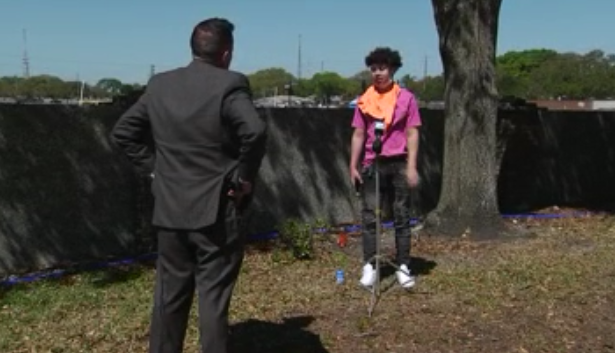TAMPA, Fla (WFLA) – “This is where I slept last night,” Damian Kauffmann said, referring to a bundle of blankets and a stuffed animal used as a “mattress.”
He claims that was his bed on a January night in a Tampa Eckerd Connects office.
“You know, it felt dirty,” Kauffman said while recording video that night. “Look at this. This is not suitable.”

Chris Card of Eckerd Connects, which administers foster care in the Tampa Bay area, would not comment on specifics about Kauffman’s claim due to privacy issues. Card said Eckerd has a Tampa office known as “the family place” that has not been regularly staffed during the pandemic, but he added foster children may occasionally go there on their own.
“I don’t know the circumstances there,” Card said. “But again, our rules are very strict and they would not be there without supervision.”
According to Kauffmann, he was told to go to the North Florida Avenue office and wait for a case worker to take him to his next foster home.
“No one came,” he said. “It was kind of different because normally you’d be at a home in your bed. You’re not just normally sleeping on tile.”
While emphasizing Eckerd would not leave a child unsupervised over night, Card said children are still placed in offices when licensed locations are not available.

In 2019, 75 Hillsborough County foster children spent at least one night in an unlicensed setting. Another 18 in Pasco and Pinellas County spent at least one night in an unlicensed setting in 2019 – but the Pasco and Pinellas data does not include the first four months of the year 2019.
The total of 93 went down to 64 last year in the three bay area counties Eckerd serves. Card said those cases more than likely involved emergency, last minute placements.
“Until you’re in this on a daily basis I could see how it would be difficult to understand,” Card said. “But to try to find a program and a family that will take care of these kids is difficult.”
Office placements were first exposed by 8 On Your Side years ago, with a 2018 report showing surveillance video of children spending hours waiting in cars with caseworkers in a Wawa convenience store parking lot for their next place to live.
Only weeks after the report aired, Eckerd terminated its contract with the company that had provided its case managers. Later that year, Eckerd created a corrective action plan ordered by the Department of Children and Families.
Card, who joined the company in May of that year, said “there are sill some kids we’re struggling with.”
“Some of these youths are so far down the path by the time they come to us, our resources are limited in finding them a [long-term] placement that works,” Card said.
In so-called “night-to-night” placements involving children who, for various reasons, move from house to house, an average of 38 children a day needed a new spot last year in Hillsborough, Pasco and Pinellas. That was down slightly from the average of 40 a day in 2019.
Card said Eckerd has implemented programs to find a fit for children who are difficult to place due to various factors including the child’s preferences and emotional issue.
“I’m not blaming these kids. This is rough situation they’re in and they’re scared and they’re traumatized,” Card said. “But I also don’t blame the placements for saying, we can’t handle that.”
Kauffmann said he has “lost count” of the number of foster homes he has stayed in since he last lived with his biological family about two years ago.
“Everyone else has their own story but I just want mine to be known and have people to understand what happens,” Kauffmann said. “Like, life’s not always easy.”
Card said Eckerd is open to ideas from the community about finding permanent placements for what he calls a small percentage of the 2,700 bay area children currently in licensed care with Eckerd.
“We want to find a placement for every child,” Card said. “In these cases, it’s difficult to find a place that would willingly accept them and bouncing around doesn’t help. It makes it harder for those kids to stabilize.”
There are currently just under 1,600 licensed foster homes in the bay area, with a little more than half in Hillsborough, and the rest in Pasco and Pinellas.
Eckerd Connects is currently in the final year of a five-year contract with the Florida Department of Children and Families that pays the non-profit about $77 million a year. According to Card, the company is submitting a bid to continue as the DCF provider in Hillsborough, Pasco and Pinellas Counties.






